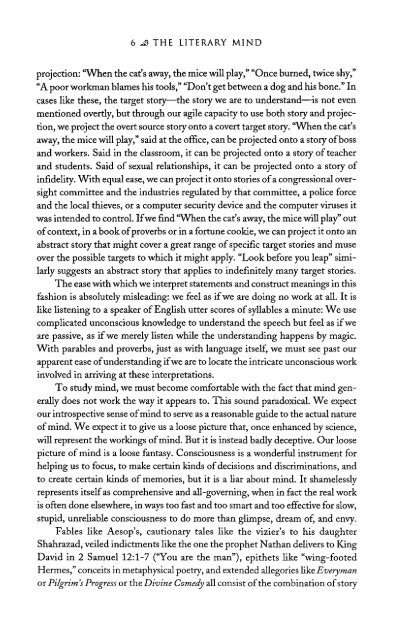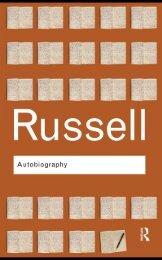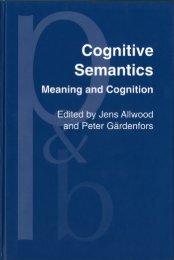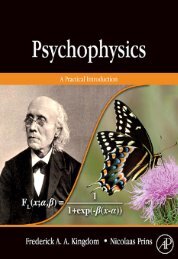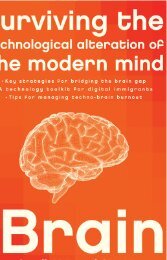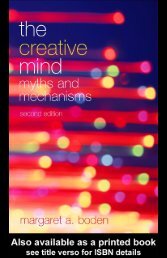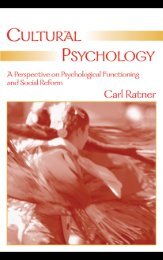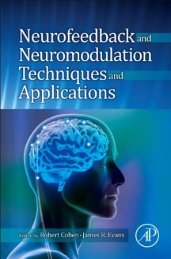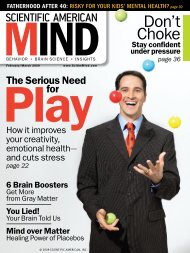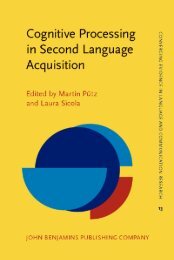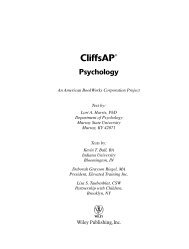The Literary Mind.pdf
The Literary Mind.pdf
The Literary Mind.pdf
You also want an ePaper? Increase the reach of your titles
YUMPU automatically turns print PDFs into web optimized ePapers that Google loves.
6 THE LITERARY MIND<br />
projection: "When the cat's away, the mice will play," "Once burned, twice shy,"<br />
"A poor workman blames his tools," "Don't get between a dog and his bone." In<br />
cases like these, the target story—the story we are to understand—is not even<br />
mentioned overtly, but through our agile capacity to use both story and projection,<br />
we project the overt source story onto a covert target story. "When the cat's<br />
away, the mice will play," said at the office, can be projected onto a story of boss<br />
and workers. Said in the classroom, it can be projected onto a story of teacher<br />
and students. Said of sexual relationships, it can be projected onto a story of<br />
infidelity. With equal ease, we can project it onto stories of a congressional oversight<br />
committee and the industries regulated by that committee, a police force<br />
and the local thieves, or a computer security device and the computer viruses it<br />
was intended to control. If we find "When the cat's away, the mice will play" out<br />
of context, in a book of proverbs or in a fortune cookie, we can project it onto an<br />
abstract story that might cover a great range of specific target stories and muse<br />
over the possible targets to which it might apply. "Look before you leap" similarly<br />
suggests an abstract story that applies to indefinitely many target stories.<br />
<strong>The</strong> ease with which we interpret statements and construct meanings in this<br />
fashion is absolutely misleading: we feel as if we are doing no work at all. It is<br />
like listening to a speaker of English utter scores of syllables a minute: We use<br />
complicated unconscious knowledge to understand the speech but feel as if we<br />
are passive, as if we merely listen while the understanding happens by magic.<br />
With parables and proverbs, just as with language itself, we must see past our<br />
apparent ease of understanding if we are to locate the intricate unconscious work<br />
involved in arriving at these interpretations.<br />
To study mind, we must become comfortable with the fact that mind generally<br />
does not work the way it appears to. This sound paradoxical. We expect<br />
our introspective sense of mind to serve as a reasonable guide to the actual nature<br />
of mind. We expect it to give us a loose picture that, once enhanced by science,<br />
will represent the workings of mind. But it is instead badly deceptive. Our loose<br />
picture of mind is a loose fantasy. Consciousness is a wonderful instrument for<br />
helping us to focus, to make certain kinds of decisions and discriminations, and<br />
to create certain kinds of memories, but it is a liar about mind. It shamelessly<br />
represents itself as comprehensive and all-governing, when in fact the real work<br />
is often done elsewhere, in ways too fast and too smart and too effective for slow,<br />
stupid, unreliable consciousness to do more than glimpse, dream of, and envy.<br />
Fables like Aesop's, cautionary tales like the vizier's to his daughter<br />
Shahrazad, veiled indictments like the one the prophet Nathan delivers to King<br />
David in 2 Samuel 12:1-7 ("You are the man"), epithets like "wing-footed<br />
Hermes," conceits in metaphysical poetry, and extended allegories like Everyman<br />
or Pilgrim's Progress or the Divine Comedy all consist of the combination of story


